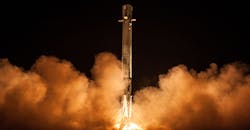A military satellite launched by Elon Musk’s Space Exploration Technologies Corp. appears to have crashed into the sea following a malfunction in the latter stages of its ascent, representing a potential setback for the billionaire’s rocket program.
The mission -- referred to by the code name Zuma -- took off from Cape Canaveral Air Force Station in Florida Sunday on a SpaceX Falcon 9 rocket. But the U.S. Strategic Command, which monitors more than 23,000 man-made objects in space, said it is not tracking any new satellites following the launch.
“We have nothing to add to the satellite catalog at this time,” Navy Captain Brook DeWalt, a spokesman for the command, said in an email when asked if the new satellite was in orbit.
A U.S. official and two congressional aides familiar with the launch said on condition of anonymity that the second-stage booster section of the Falcon 9 failed. The satellite was lost, one of the aides said, and the other said both the satellite and second-stage rocket fell into the ocean.
“We do not comment on missions of this nature; but as of right now reviews of the data indicate Falcon 9 performed nominally,” James Gleeson, a spokesman for SpaceX, said in an email.
It’s also possible that the Zuma satellite failed to properly separate, meaning the fault may not have been with the launch system, according to discussions on SpaceX’s twitter feed. Commentary during a webcast of the launch appeared to confirm that the fairings housing the payload were successfully deployed.
Tim Paynter, a spokesman for Northrop Grumman Corp., which was commissioned by the Defense Department to choose the launch contractor, said “we cannot comment on classified missions.” Army Lieutenant Colonel Jamie Davis, the Pentagon spokesman for space policy, referred questions to SpaceX.
The launch was SpaceX’s first in what is due to be a busy year. The company has said it plans about 30 missions in 2018 after completing a record 18 last year. The takeoff had been pushed back several times since late 2017, with the past week’s extreme weather on the East Coast contributing to the latest delay.
The Zuma mission was a clear success on at least one count: SpaceX successfully landed the rocket’s first stage for reuse in a future launch, a key step in its goal to drive down the cost of access to space.
SpaceX’s 23-minute webcast of the event Sunday evening included the Falcon 9 launch and the rocket’s first-stage recovery on land in Florida. Cheers from employees could be heard from Mission Control at the company’s headquarters in Hawthorne, California.
The webcast then concluded. During launches for commercial satellite customers, SpaceX typically returns to the webcast to confirm that the payload has separated from the second stage, but Zuma was a classified mission so the lack of further messages wasn’t surprising.
Falcon Heavy
SpaceX, the closely held company founded and led by Musk -- who also heads the electric auto manufacturer Tesla Inc. -- is slated to demonstrate the maiden flight of Falcon Heavy, a larger and more powerful rocket, later this month. SpaceX, along with Boeing Co., also has a contract with NASA to fly astronauts to the International Space Station as part of the “Commercial Crew” program, with the first crucial test flight scheduled for the second quarter.
SpaceX competes for military launches with United Launch Alliance, a joint venture of Boeing and Lockheed Martin Corp., which was the sole provider for the Pentagon until Musk began a campaign in Congress and the courts challenging what he called an unfair monopoly. After a rigorous Air Force review, SpaceX was certified in 2015 to compete for military launches.
By Tony Capaccio and Dana Hull
About the Author
Bloomberg
Licensed content from Bloomberg, copyright 2016.
